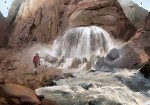 出埃及记第九课:磐石出水:出埃及记 17-18章
出埃及记第九课:磐石出水:出埃及记 17-18章
摩西是《圣经》里的重要人物之一。也许以下的问题会让您认识他更深。
一。出埃及记17:1:“按着站”(普通话本翻为“逐步迁移”);参看民数记33章。 耶和华神指引摩西和以色列人,告诉他们什么时候走,什么时候停。
二。出埃及记17:1-7:群众向摩西表示什么态度?他们说什么?神告诉摩西要怎么样解决他们的问题?其实,缺水不是他们基本的问题;以色列人的基本问题是什么(7节)?依靠了神这么久,亲眼见到神的大能这么多次之后,他们还是怀疑什么?出埃及记17章7节,下半节,是出埃及记里最可悲的一句话之一;是哪句?今天,我们是否口头上称赞神,但实际上怀疑他的同在?为了讨神的喜悦,神要我们完完全全地相信他和___ ___他 。
三。出埃及记17:8-13:请述说以色列人怎么样战胜亚玛力人。从此次的战争,以色列人应该晓得谁才是 他们惟一的依靠?
四。出埃及记17:16:“耶和华必世世代代和亚玛力人争战”。多年后,以色列的第一个国王,扫罗,跟亚玛力人作对,但是扫罗没有“彻底毁灭他们所有的一切”(撒母耳记上15章)。再过许多年,当以斯帖记所记载的(第三章)亚甲族哈米大他的儿子哈曼密谋毁灭犹太人;有些解《经》家认为这哈曼大概是亚玛力人的后裔。所以连那时候,神的选民还是和亚玛力人“争战”。
五。出埃及记17:14:难道摩西识字吗?那时候,希伯来人有文字和文具吗?除了摩西所写的“摩西五书”以外,当时还有什么书?参看民数记21:14。
六。出埃及记16章和17章:至少在四方面,耶和华神证明告诉以色列群众,他要保护他们。请列出章节如下:
1)吃:
2)喝:
3)走:
4)战:
以色列人有什么理由怀疑神的爱、同在和保护?
七。出埃及记18:1-7,请列出以下人名:
摩西岳父:
妻子:
两个儿子:
八。出埃及记18:8-12:摩西告诉岳父何事?岳父反应如何?叶忒罗是“一神论”者还是“多神论”者?你为什么这么说呢?
九。出埃及记18:13-27:摩西不但是以色列人的领袖,他又站什么角色?是摩西花很多时间做什么?岳父叶忒罗向摩西说什么智慧话?摩西当拣选什么样的人协助他(21节)?叶忒罗劝摩西的动机是什么(17,23节)?摩西是否听从岳父?摩西既有神的灵在心里,人又很聪明,所以他怎么没有早想到这点?神自己怎么没有早告诉摩西要如此做?这件事情证明神不阻碍属于他的好人和领袖___ ___自己;神期望我们用他所赐的智慧___ ___自己。今天,在教会里头,神有没有设立一种制度,使得教会弟兄姐妹分(主耶稣的)工合作?
十。出埃及记18:20:摩西主要的责任是什么(20节)?岳父叶忒罗使得摩西能够负好当负的___ ___;他让摩西荣神___人。今天,您不一定不是一位“摩西”或是一位“叶忒罗”。做“摩西”的你,是否需要一位“叶忒罗”过来劝告你几句智慧话呢?做“叶忒罗”的你,是否有爱心和责任感,是否有胆量,去面对你的“摩西”告诉他,他所需要听到的劝告?岳父叶忒罗是我们大多数人的好榜样。摩西很谦虚地聆听岳父叶忒罗的劝告,也是当领袖的好榜样。
读者:欢迎您把这篇短文下载,复印,用在您的《圣经》班里。
Bible Study Questions: Exodus Lesson Nine
Exodus 17-18: Water from the Rock
1. 1.“By stages”(RSV and NRSV) or “from place to place” (NIV) [Two Chinese versions are quoted: Chinese Union Version is similar to RSV; Easy-to-Read Chinese means “moved or migrated step by step.”] See Numbers 33. Jehovah God guided Moses and the Israelites and told them when to move and when to stop.
2.Ex. 17:1-7: The community q_______ with Moses, after which they said what? God told Moses to solve the problem by doing what? Actually, lack of water was not their basic problem; what was the Israelites’ basic problem (v. 7)? They had relied on God for this long and had seen God’s power with their own eyes these several times, but what did they still question? (Ex. 17:7b is one of the saddest sentences in the book of Exodus.) Today, do we praise God with our lips but in reality doubt his presence in our lives? In order to obtain God’s goodwill, God expects us to completely believe him and o_____ him.
3.Ex. 17:8-13: Describe how the Israelites defeated the Amalekites. From this encounter, the Israelites should know that they could rely only on J______.
4.Ex. 17:16: “The LORD will be at war against the Amalekites from generation to generation.” Many years later, the first Israelite king, Saul, fought with the Amalekites. But he did not “totally destroy everything that belongs to them” (1 Samuel 15). Still many years later, in the book of Esther (ch. 3), Haman son of Hammedatha, the Agagite, conspired to eliminate the Jews. Some Bible scholars believe that this Haman was probably a descendant of the Amalekites. So even at that time, God’s chosen people were still “at war” with the Amalekites.
5.Ex. 17:14: Could Moses write? Did the Hebrews have writing and writing materials? (Other than the “five books of Moses,” what other books were there at that time? See Numbers 21:14 ).
6.Ex. chs. 16 and 17: In at least four ways, Jehovah God proves to the Israelite community that God wants to protect them. Give the appropriate chapter and verse for each of these proofs: 1) Food_______; 2) Drink______; 3) Going forward ________; 4) Warfare_______.
7.Ex. 18:1-7: Name the following relatives of Moses: Father-in-law; wife; two sons.
8.Ex. 18:8-12: What did Moses tell his father-in-law? What was the reaction of the father-in-law? Was Jethro a monotheist or a polytheist?
9.Ex. 18:13-27: Not only was Moses the leader of the Israelites, he was also their j_____. What did Moses spend a lot of time doing? What wise council did father-in-law Jethro give Moses? What kind of people should Moses choose (v.21)? Has God instituted any kind of system in the church today to enable Christian brothers and sisters to “divide the (Lord’s) work and to labor in unity”? What was Jethro’s motivation for thus advising Moses (vs. 17 and 23)? Did Moses listen to his father-in-law? Moses had God’s Spirit and he was intelligent besides, so why did Moses not think at an earlier time of doing what Jethro told him to do? Why did God himself not tell Moses to do this? This shows that God does not impede his own good people and leaders from w______ themselves o___. God expects us to use the wisdom that he gives us to t____ c____ of ourselves.
10.What was Moses’ main responsibility (v. 20)? Father-in-law Jethro enabled Moses to perform the r________ that he should perform; Jethro enabled Moses to gl_____ God and h____ mankind. Today, perhaps you are a “Moses” or a “Jethro.” If you are a “Moses,” do you need a “Jethro” to come and urge or exhort you with some words of wisdom? If you are a “Jethro,” do you have a heart of love and a sense of responsibility, and do you have the courage to go and face your “Moses” and tell him the words of exhortation that he needs to hear? Jethro is a good example for the majority of us. Moses humbly listened to the urging from this father-in-law, Jethro, and in so doing Moses is a good example for those who are leaders.
圣经问答
出埃及记第九课:磐石出水:出埃及记 17-18章
Bible Study Questions: Exodus Lesson Nine
Exodus 17-18: Water from the Rock
作者:谢德华 ©By Edward Short
本文所问的问题使用汉子圣经。
欢迎您把此文下载用在圣经班或私人学习。
A series of Bible lessons, written in Chinese
and based largely on the text of the Chinese Bible.
You may download and print copies of this lesson
for use in your Bible class.
World Christian Broadcasting
Franklin, TN 37067 USA
